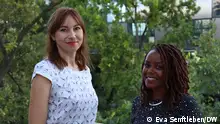Master's Degree
How journalists can challenge conventional perceptions of the textile industry
"In order to correct an image, we sometimes have to replace it completely," stated Dutch consumer critic Ed van Hinte in his opening speech at this year's Image Corrections conference in Leipzig.
Around 120 students from Deutsche Welle Akademie, the German School of Journalism, the Academy for Fashion and Design and the Universities of Leipzig, Bamberg and Munich met between November 23 and 25, 2017 to discuss the topic of fashion and development with international experts. "The basic idea of the conference, co-organized by Engagement Global, the German service for development initiatives, is to adopt other views, not just Eurocentric ones, but also those of experts from other countries," explained Sabine Witt, head of the Saxony branch of Engagement Global.
Conference participants had the opportunity explore and deepen their journalistic skills. Students of the International Media Studies program (IMS) at DW Akademie organized and hosted a panel debate called "Recycling? Upcycling? Cradle to cradle? Sustainable Clothing?" The students also developed an evening event featuring social media videos and a fashion show, all created specifically for the event. The seminar's lecturer Petra Kohnen, the coordinator of the international language programs at the DW Akademie, was very pleased about the results: "The IMS students were a real asset to the conference. There could not been a better way of addressing the topic of fashion and development." Kohnen emphasized that once again, practice had shown that good preparation was vital to success: "They should really be proud of themselves. I think it was an important experience for the students to actually be part of such a large scale event from the very beginning."
Journalists are encouraged to delve deeper
Experts and journalists from Germany, Uganda, Romania, Uzbekistan, Albania, Italy and the Netherlands held discussions with the students. Participants also had the opportunity to ask critical questions. Laura Stefanut, an investigative journalist from Romania, encouraged the future journalists to delve deeper in their research on the fashion industry: "If you tell great stories, you will also make an impact." One of the things Stefanut's research revealed was that the label "Made in Europe" is by no means a guarantee for fair working conditions in the textile industry. In Romania and Bulgaria, women in particular earn less than a living wage, and, according to Stefanut, under disastrous conditions.

Participants of the panel debate "Sustainable Fashion" discussed the effects of different methods of recycling and upcycling.
A lot must be done
Other panel debates included topics like "Cotton production in Uzbekistan," "Sustainability in the fashion industry" and the "Myth of 'Made in Europe.'" In addition to the international business and science perspective, participants also explored the portrayal of these topics in the media. "The panel discussions offered a new perspective on fashion and development. We cannot only blame the textile industry, but also need to look at society as a whole. As journalists, we are also responsible and need to conduct bold research," said Cindy Portillo, an IMS student from El Salvador. But Portillo herself has not yet managed to integrate the "image corrections" into everyday life, saying, "Personally, I still find it difficult to consume in a sustainable and fair manner, and I think I still have a lot of catching up to do."
- Date 11.12.2017
- Author Lina Friedrich
- Feedback: Send us your feedback.
- Print Print this page
- Permalink https://p.dw.com/p/2p8wD
- Date 11.12.2017
- Author Lina Friedrich
- Send us your feedback.
- Print Print this page
- Permalink https://p.dw.com/p/2p8wD




